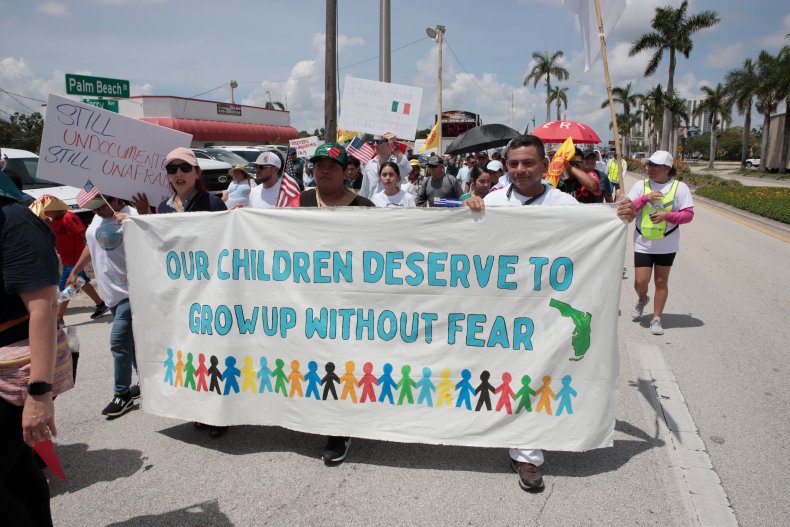Jaime, a Honduras native and undocumented immigrant, came to the United States alone almost 10 years ago to make a better life for himself in Florida. But he was forced to flee his home and start over after the sweeping anti-immigration bill signed by Gov. Ron DeSantis went into effect on July 1.
"I had to change jobs and move out of the state," Jaime, who declined to provide his last name to protect his identity, told Newsweek through his attorney. He's now living and working as a cook in North Carolina.
"The worst part is living separated from my family... financially, it is more difficult being away from them, but I don't have any choice. I can't risk being there and getting myself deported."

He is hopeful that he could be reunited with his family soon. His application for a T visa—a program designed to help victims of human trafficking—is pending. Human trafficking is defined in federal and Florida law as the use of force, fraud or coercion to exploit people through sex or labor for financial or personal gain. The Florida Legislature says it's a form of modern-day slavery.
Jaime is among many undocumented immigrants who reportedly fled Florida when Senate Bill 1718 came into effect last month.
DeSantis signed it into law in May, weeks before entering the race for the White House. He has long made hardening Florida's immigration laws a priority and heaved criticism on President Joe Biden's border policy as he works to sway Republican primary voters away from Donald Trump.
The law expands requirements for businesses with more than 25 staffers to use E-Verify, a federal system that determines if employees can legally work in the U.S. Employers who don't comply with the law face fines of $1,000 per day until they provide proof that their workers are legal citizens.
The law also bolsters DeSantis' migrant relocation program and prohibits local governments from providing money to organizations that issue identification cards to immigrants lacking permanent legal status. Additionally, it invalidates out-of-state driver's licenses held by people living in the country illegally.
Undocumented immigrants who remain in Florida are at greater risk of being exploited by their employers because of the new law, said Giulia Fantacci, a Florida-based attorney who works to help victims of human trafficking legalize their status.
In labor exploitation cases, employers "know that the worker is undocumented and so they will take advantage of their immigration status to then force them... to do certain types of work or additional work that's not part of what they're supposed to do," Fantacci told Newsweek.
Those workers can also be forced to work under the threat of having their immigration status reported to authorities, she said.

Despite the requirement that E-Verify is used, employers may still hire or retain undocumented workers and severely underpay them, she said.
"The idea is, 'I'm giving you this job, I'm taking the risk, you can work here, but you're gonna be paid this much.'... and so that's when they can increase the risk of being exploited," she said.
Renata Bozzetto, the deputy director of the Florida Immigrant Coalition, said Florida "has been called ground zero for modern slavery because of the long and recent list of migrant workers who have been abused in the state."
SB 1718 "is not being enacted in a vacuum—it is incredibly concerning that a law with so many fear-inducing and punitive measures is being implemented in a state where workers' protections are already tenuous," she told Newsweek. "There is no doubt that abuse thrives when workers fear leaving their workplace, do not have recourses to recover stolen wages, or are afraid to reach out to law enforcement to report abuse. That is why SB 1718 is not only reckless, it is also cruel."
She added the law "is a clearly a public safety issue; by nurturing fear, SB 1718 allows for crime to thrive."
DeSantis spokesperson Julia Friedland told Newsweek: "The source of 70% of all human trafficking in this nation is illegal immigration and efforts to curb illegal immigration will also combat human trafficking. Further, 60% of unaccompanied alien children crossing the border were caught by cartels and exploited for drug trafficking or worse.
"To combat this increase in illegal immigration and the human trafficking that has come as a result, Governor DeSantis signed the strongest legislation in the country to protect Florida from Biden's border crisis and another four pieces of legislation to fight human trafficking. Among its provisions, the legislation enhances penalties for human smuggling, raises awareness of the signs and impacts of human trafficking, and imposes critical reforms to hold human traffickers accountable."
A lot of Fantacci's clients have moved to states that are more welcoming of immigrants, she said.
"They work in construction or they work on farms and so they're going to states where there's farmland, they're going to states where there is a lot of construction so they can find jobs," she said.
But they also face risks. "They're starting a new job, so that could expose them to additional cases where they could be exploited," she said.
It's important for undocumented immigrants to remember that "even if you don't have papers, you have rights," Fantacci said.
"If there are situations where you feel like you're being taken advantage of, you're being threatened in your job, you need to seek the help of an attorney that understands and may be able to help you."
Many "don't understand that they can fix their status," she added. "It's a huge weight off their shoulders once they understand that."
Update 8/26/23, 4:20 a.m. ET: This article has been updated with comment from Renata Bozzetto.








